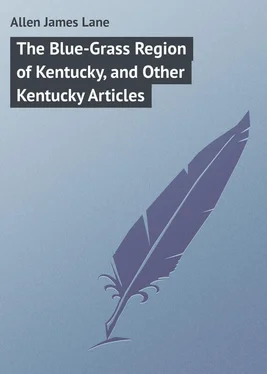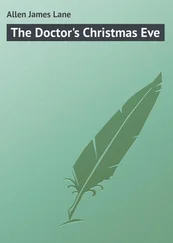James Allen - The Blue-Grass Region of Kentucky, and Other Kentucky Articles
Здесь есть возможность читать онлайн «James Allen - The Blue-Grass Region of Kentucky, and Other Kentucky Articles» — ознакомительный отрывок электронной книги совершенно бесплатно, а после прочтения отрывка купить полную версию. В некоторых случаях можно слушать аудио, скачать через торрент в формате fb2 и присутствует краткое содержание. Жанр: foreign_prose, Путешествия и география, на английском языке. Описание произведения, (предисловие) а так же отзывы посетителей доступны на портале библиотеки ЛибКат.
- Название:The Blue-Grass Region of Kentucky, and Other Kentucky Articles
- Автор:
- Жанр:
- Год:неизвестен
- ISBN:нет данных
- Рейтинг книги:3 / 5. Голосов: 1
-
Избранное:Добавить в избранное
- Отзывы:
-
Ваша оценка:
- 60
- 1
- 2
- 3
- 4
- 5
The Blue-Grass Region of Kentucky, and Other Kentucky Articles: краткое содержание, описание и аннотация
Предлагаем к чтению аннотацию, описание, краткое содержание или предисловие (зависит от того, что написал сам автор книги «The Blue-Grass Region of Kentucky, and Other Kentucky Articles»). Если вы не нашли необходимую информацию о книге — напишите в комментариях, мы постараемся отыскать её.
The Blue-Grass Region of Kentucky, and Other Kentucky Articles — читать онлайн ознакомительный отрывок
Ниже представлен текст книги, разбитый по страницам. Система сохранения места последней прочитанной страницы, позволяет с удобством читать онлайн бесплатно книгу «The Blue-Grass Region of Kentucky, and Other Kentucky Articles», без необходимости каждый раз заново искать на чём Вы остановились. Поставьте закладку, и сможете в любой момент перейти на страницу, на которой закончили чтение.
Интервал:
Закладка:
For it must not be forgotten, first of all, that the condition of the slave in Kentucky was measurably determined by certain physical laws which lay beyond the control of the most inhuman master. Consider the nature of the country – elevated, rolling, without miasmatic districts or fatal swamps; the soil in the main slave-holding portions of the State easily tilled, abundantly yielding; the climate temperate and invigorating. Consider the system of agriculture – not that of vast plantations, but of small farms, part of which regularly consisted of woodland and meadow that required little attention. Consider the further limitations to this system imposed by the range of the great Kentucky staples – it being in the nature of corn, wheat, hemp, and tobacco, not to yield profits sufficient to justify the employment of an immense predial force, nor to require seasons of forced and exhausting labor. It is evident that under such conditions slavery was not stamped with those sadder features which it wore beneath a devastating sun, amid unhealthy or sterile regions of country, and through the herding together of hundreds of slaves who had the outward but not the inward discipline of an army. True, one recalls here the often quoted words of Jefferson on the raising of tobacco – words nearly as often misapplied as quoted; for he was considering the condition of slaves who were unmercifully worked on exhausted lands by a certain proletarian type of master, who did not feed and clothe them. Only under such circumstances could the culture of this plant be described as "productive of infinite wretchedness," and those engaged in it as "in a continual state of exertion beyond the powers of nature to support." It was by reason of these physical facts that slavery in Kentucky assumed the phase which is to be distinguished as domestic; and it was this mode that had prevailed at the North and made emancipation easy.
Furthermore, in all history the condition of an enslaved race under the enslaving one has been partly determined by the degree of moral justification with which the latter has regarded the subject of human bondage; and the life of the Kentucky negro, say in the days of Uncle Tom, was further modified by the body of laws which had crystallized as the sentiment of the people, slave-holders themselves. But even these laws were only a partial exponent of what that sentiment was; for some of the severest were practically a dead letter, and the clemency of the negro's treatment by the prevailing type of master made amends for the hard provisions of others.
It would be a difficult thing to write the history of slavery in Kentucky. It is impossible to write a single page of it here. But it may be said that the conscience of the great body of the people was always sensitive touching the rightfulness of the institution. At the very outset it seems to have been recognized simply for the reason that the early settlers were emigrants from slave-holding States and brought their negroes with them. The commonwealth began its legislation on the subject in the face of an opposing sentiment. By early statute restriction was placed on the importation of slaves, and from the first they began to be emancipated. Throughout the seventy-five years of pro-slavery State-life, the general conscience was always troubled.
The churches took up the matter. Great preachers, whose names were influential beyond the State, denounced the system from the pulpit, pleaded for the humane and Christian treatment of slaves, advocated gradual emancipation. One religious body after another proclaimed the moral evil of it, and urged that the young be taught and prepared as soon as possible for freedom. Antislavery publications and addresses, together with the bold words of great political leaders, acted as a further leaven in the mind of the slave-holding class. As evidence of this, when the new constitution of the State was to be adopted, about 1850, thirty thousand votes were cast in favor of an open clause in it, whereby gradual emancipation should become a law as soon as the majority of the citizens should deem it expedient for the peace of society; and these votes represented the richest, most intelligent slave-holders in the State.
In general the laws were perhaps the mildest. Some it is vital to the subject not to pass over. If slaves were inhumanly treated by their owner or not supplied with proper food and clothing, they could be taken from him and sold to a better master. This law was not inoperative. I have in mind the instance of a family who lost their negroes in this way, were socially disgraced, and left their neighborhood. If the owner of a slave had bought him on condition of not selling him out of the county, or into the Southern States, or so as not to separate him from his family, he could be sued for violation of contract. This law shows the opposition of the better class of Kentucky masters to the slave-trade, and their peculiar regard for the family ties of their negroes. In the earliest Kentucky newspapers will be found advertisements of the sales of negroes, on condition that they would be bought and kept within the county or the State. It was within chancery jurisdiction to prevent the separation of families. The case may be mentioned of a master who was tried by his Church for unnecessarily separating a husband from his wife. Sometimes slaves who had been liberated and had gone to Canada voluntarily returned into service under their former masters. Lest these should be overreached, they were to be taken aside and examined by the court to see that they understood the consequences of their own action, and were free from improper constraint. On the other hand, if a slave had a right to his freedom, he could file a bill in chancery and enforce his master's assent thereto.
But a clear distinction must be made between the mild view entertained by the Kentucky slave-holders regarding the system itself and their dislike of the agitators of forcible and immediate emancipation. A community of masters, themselves humane to their negroes and probably intending to liberate them in the end, would yet combine into a mob to put down individual or organized antislavery efforts, because they resented what they regarded an interference of the abolitionist with their own affairs, and believed his measures inexpedient for the peace of society. Therefore, the history of the antislavery movement in Kentucky, at times so turbulent, must not be used to show the sentiment of the people regarding slavery itself.
From these general considerations it is possible to enter more closely upon a study of the domestic life and relations of Uncle Tom and the Shelbys.
"Whoever visits some estates there," wrote Mrs. Stowe, "and witnesses the good-humored indulgence of some masters and mistresses and the affectionate loyalty of some slaves, might be tempted to dream of the oft-fabled poetic legend of a patriarchal institution." Along with these words, taken from Uncle Tom's Cabin , I should like to quote an extract from a letter written me by Mrs. Stowe under date of April 30, 1886:
"In relation to your letter, I would say that I never lived in Kentucky, but spent many years in Cincinnati, which is separated from Kentucky only by the Ohio River, which, as a shrewd politician remarked, was dry one-half the year and frozen the other. My father was president of a theological seminary at Walnut Hills, near Cincinnati, and with him I travelled and visited somewhat extensively in Kentucky, and there became acquainted with those excellent slave-holders delineated in Uncle Tom's Cabin . I saw many counterparts of the Shelbys – people humane, conscientious, just and generous, who regarded slavery as an evil and were anxiously considering their duties to the slave. But it was not till I had finally left the West, and my husband was settled as professor in Bowdoin College, Brunswick, Maine, that the passage of the fugitive-slave law and the distresses that followed it drew this from me."
Читать дальшеИнтервал:
Закладка:
Похожие книги на «The Blue-Grass Region of Kentucky, and Other Kentucky Articles»
Представляем Вашему вниманию похожие книги на «The Blue-Grass Region of Kentucky, and Other Kentucky Articles» списком для выбора. Мы отобрали схожую по названию и смыслу литературу в надежде предоставить читателям больше вариантов отыскать новые, интересные, ещё непрочитанные произведения.
Обсуждение, отзывы о книге «The Blue-Grass Region of Kentucky, and Other Kentucky Articles» и просто собственные мнения читателей. Оставьте ваши комментарии, напишите, что Вы думаете о произведении, его смысле или главных героях. Укажите что конкретно понравилось, а что нет, и почему Вы так считаете.











